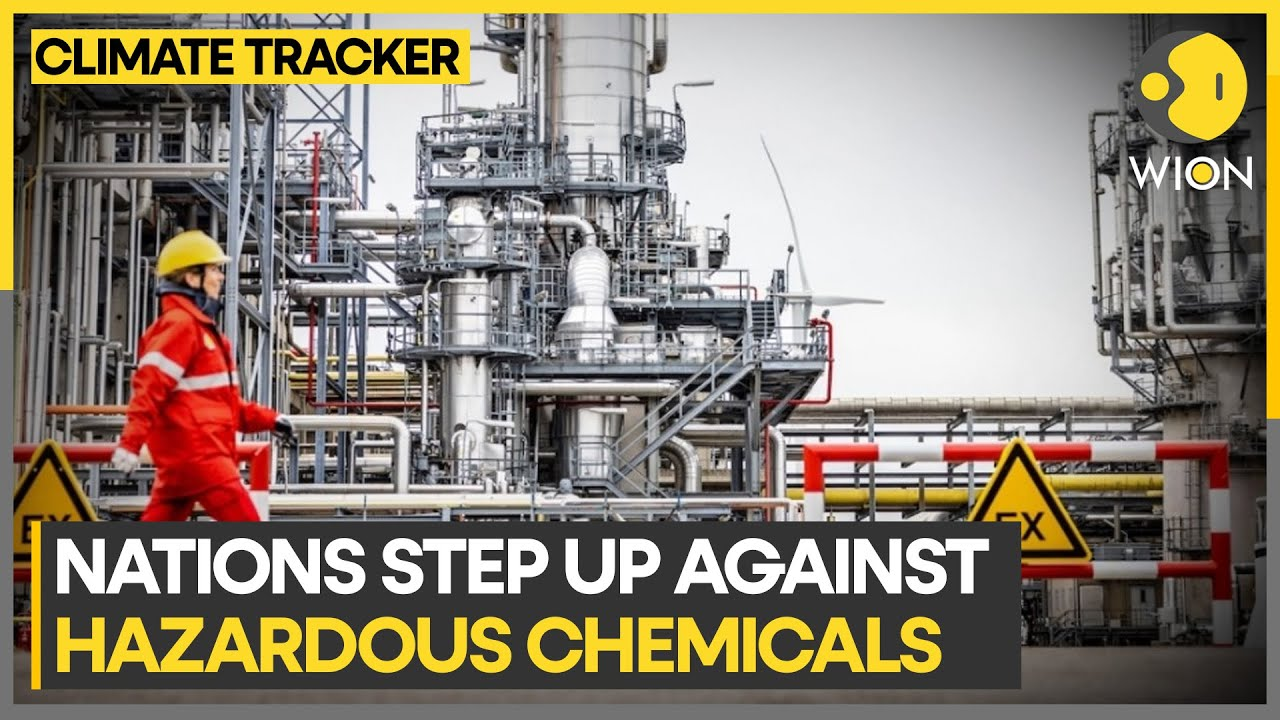





Copyright infringement not intended
Picture Courtesy: WION
Context: The United Nations Conference in Bonn (Germany) adopted a new global framework on September 30, 2023, aimed at reducing environmental risks associated with chemicals and waste. This framework, known as the Global Framework on Chemicals, establishes concrete targets and guidelines for managing chemicals throughout their lifecycle.
UN Conference on Chemicals Management
About
Key Commitments from the UN Bonn summit include:
|
Aim and Vision
|
●The new framework called the Global Framework on Chemicals (GFC), is a voluntary, multi-stakeholder and multi-sectoral platform that aims to promote cooperation and coordination among all actors involved in the production, use, trade and disposal of chemicals and waste. ●The framework is based on a vision of "a world where chemicals are produced and used in ways that minimize significant adverse impacts on human health and the environment". ●The framework is guided by 10 principles, such as precaution, prevention, polluter pays, right to know, access to information and justice, gender equality and empowerment of women and girls. |
|
Key Targets |
●The framework sets 28 concrete targets for achieving responsible management of chemicals and waste by 2030. These targets cover various aspects of the lifecycle of chemicals, such as design, production, use, disposal and recycling. Some of the targets include: ○Reducing by half the number of people suffering from acute or chronic diseases caused by exposure to hazardous chemicals. ○Phasing out or minimizing the use of highly hazardous pesticides. ○Eliminating lead in paint. ○Reducing marine plastic litter and microplastics. ○Increasing the share of green and sustainable chemistry. ○Enhancing transparency and traceability of chemicals in supply chains. ○Strengthening national capacities and institutions for chemicals management. ○Mobilizing adequate financial resources and technical assistance for developing countries. ●The framework sets a goal to phase out highly hazardous pesticides in agriculture by 2035 where risks have not been adequately managed. |
|
Government Policies |
●National governments pledged to formulate policies and regulations to reduce chemical pollution by 2030. This includes promoting the use of safer alternatives to hazardous chemicals. |
|
Industry Responsibility |
●Industries are also committed to managing chemicals in a way that reduces pollution and its adverse impacts. This implies adopting practices and technologies that minimize the environmental and health risks associated with chemical production and use. |
Bonn Declaration
|
International Conference on Chemicals Management ●The International Conference on Chemicals Management (ICCM) is the global forum for governments and other stakeholders to address the sound management of chemicals and waste. ●It is convened every five years by the United Nations Environment Programme (UNEP) and the Inter-Organization Programme for the Sound Management of Chemicals (IOMC). ●The ICCM plays a vital role in promoting the implementation of the Strategic Approach to International Chemicals Management (SAICM), a voluntary framework that aims to achieve the sound management of chemicals throughout their lifecycle. ●The ICCM also provides a platform for governments and other stakeholders to negotiate new international agreements on the management of specific chemicals and waste streams. ●The 5th session of the ICCM (ICCM5) was held in Bonn, Germany, from 25 to 29 September 2023. ICCM5 was a landmark event, as it saw the adoption of the Global Framework on Chemicals (GFC), a new international agreement that aims to protect human health and the environment from the harmful effects of chemicals and waste. ●The GFC is a comprehensive framework that addresses all aspects of the lifecycle of chemicals, from production and use to disposal and waste management. It sets out a vision for a planet free of harm from chemicals and waste, for a safe, healthy and sustainable future. |
Conclusion
Must Read Articles:
BONN CLIMATE MEET: https://www.iasgyan.in/daily-current-affairs/bonn-climate-meet
WORLD HEALTH ORGANIZATION: https://www.iasgyan.in/daily-current-affairs/75-years-of-world-health-organisation
UN Environment Programme (UNEP): https://www.iasgyan.in/daily-current-affairs/un-environment-programme-unep
|
PRACTICE QUESTION Q. What were the key commitments and targets established at the United Nations Conference in Bonn (Germany) through the adoption of the Global Framework on Chemicals (GFC) to address the environmental risks associated with chemicals and waste, and how do these commitments aim to promote responsible chemical management worldwide? |







© 2025 iasgyan. All right reserved